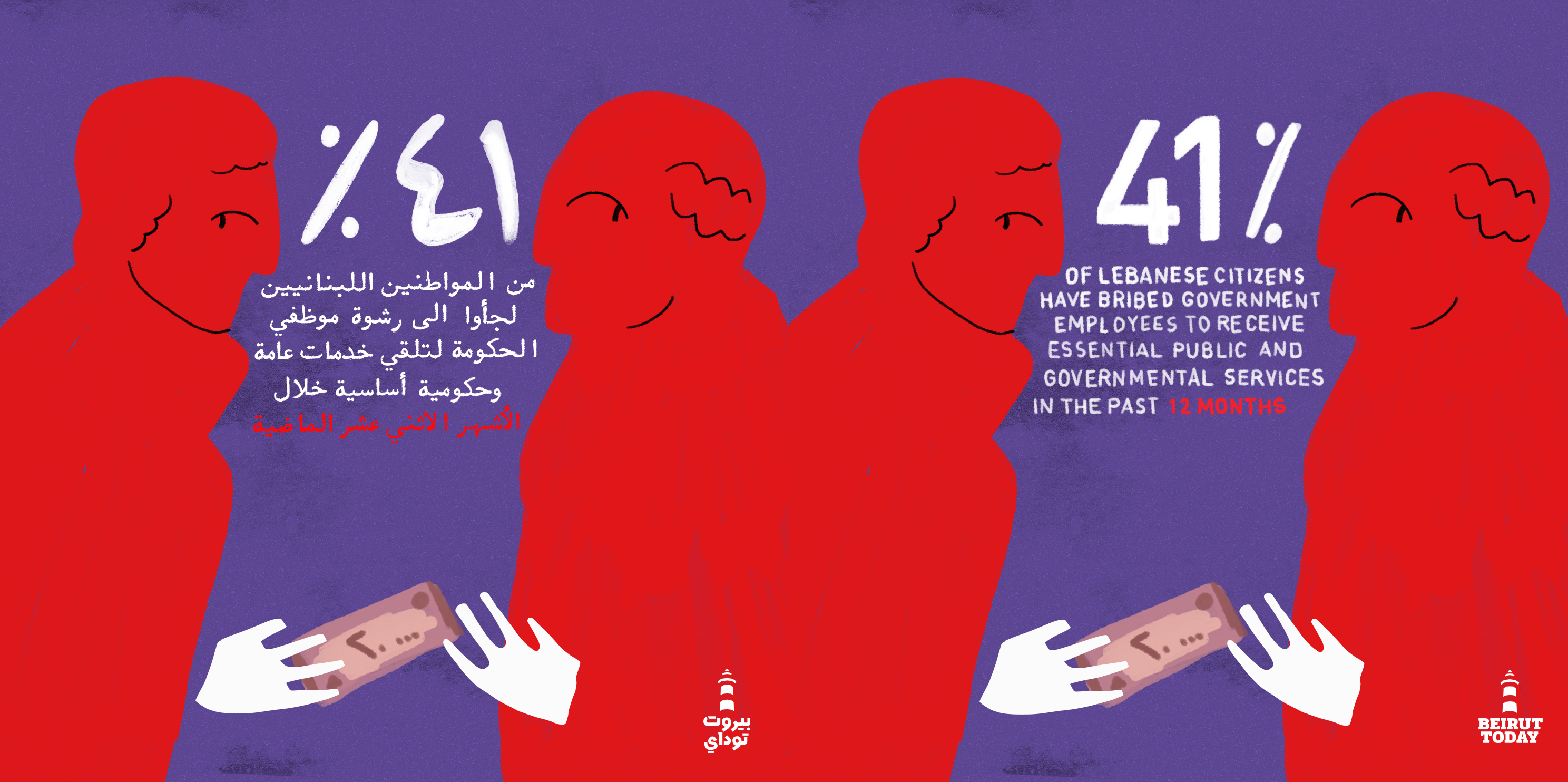Transparency International, the international NGO behind the world’s largest survey that tracks public opinion on corruption, recently published the latest edition of the Global Corruption Barometer.
The non-profit organisation, which seeks to combat global corruption with civil societal anti-corruption measures and to prevent criminal activities arising from corruption, surveyed countries in North Africa between March and August 2018 and countries in the Middle East between August and October 2019.
The results suggest –as we know by now, that corruption is prevalent in Lebanon. The key findings of the report on the MENA area were that corruption is on the rise, governments are not doing enough, and that parliamentarians and government officials are seen as most corrupt. Bribery is a regular occurrence for many, sextortion is a major issue, and political integrity is lacking especially around elections.
Results: Corruption, Bribery, And Dissatisfaction
The Transparency International results help us understand why anti-government protests and efforts to change the system persist in Lebanon.
TI surveyed 1,000 individuals in the country for their barometer. 68 percent of those surveyed believe that corruption is on the rise, 87 percent believe their government is failing to fight corruption, and 68 percent believe that most or all government officials are involved in corruption.
In addition to these figures, 89 percent believe that the corruption in the government is a big problem –indicating dissatisfaction with the current situation of the country, rather than a mere acceptance of it as a prevalent reality. Also in Lebanon, 65 percent are not satisfied with how well democracy is working.
These results also present themselves beyond the confines of the government. While the majority of citizens have little or not trust in the government (80 percent), they also do not trust the courts (72 percent) and the police (59 percent).
Out of the countries surveyed, Lebanon has the highest bribery rate. 41 percent of those surveyed in Lebanon said that they have bribed government employees in exchange for services in the past year, compared to 4 percent in Jordan, 17 percent in Palestine, 24 percent in Sudan, 18 percent in Tunisia, and 31 percent in Morocco.
At 54 percent, Lebanon also has the highest rate of use for “wasta” (personal connections) when it comes to government services. At 39 percent, Palestine came in second on this indicator. Even more participants in Lebanon (65 percent) reported using connections when coming in contact with courts and the judicial system.
Another noteworthy statistic from Lebanon indicates that 23 percent experienced sextortion or know someone who has in the past year.
The reported corruption also extends to voting and elections: TI reported that 47 percent of Lebanese were offered bribes in exchange for votes.
Two years ago, parliamentary elections in Lebanon were criticized for being unfair and undemocratic. The Lebanese Association for Democractic Elections (LADE), an election-monitoring NGO, reported over 7,000 violations during the 2018 election.
Recommendations: How Do We Fight Corruption?
The political dynamics in Lebanon create a complicated environment that contributes to corruption and the protection of corrupt individuals. Political interference, an absence of accountability and transparency and a lack of independence of the judicial system are other major challenges. Several basic requirements are fundamental to reducing the prevalence of corruption such as ensuring that people can safely report corruption.
To fight corruption, Transparency International recommends strengthening electoral integrity to allow for fair and democratic elections, the empowering whistle-blowers, and the implementation of laws dedicated to anti-corruption.
Considering the experiences shared regarding both the government and the judicial system, TI also recommends the reduction and prevention of the use of personal connections, the strengthening of judicial independence, and the promotion of the separation of powers.
TI also recognized a need for improving transparency and access to information. Despite the passing of an information access law in Lebanon two years ago, public administrations in Lebanon still fail to comply with sharing legal, organizational, and financial documents. Gherbal Initiative, a local initiative fighting corruption, tested the law by requesting financial records from 140 government institutions and public bodies in 2019. Only 65 responded, and only 32 provided the documents.
The Transparency International survey finds that while there are barriers to such anti-corruption efforts in the region, and there is fear of retaliation, people are ready and willing to take action. Thirty nine percent of Lebanese agree that ordinary citizens can make a difference in the fight against corruption. Although this figure is lower than what is reported in other MENA countries, it still offers some hope.


